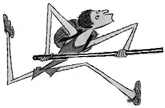



Are Black Student Athletes Getting a Free Pass on Academics?
 Over the years there have been persisting charges that student athletes, particularly black male football and basketball players, are given an easy academic ride so that they will remain eligible to participate in intercollegiate sports. One way this has been accomplished has been to cluster athletes in major subjects that have a reputation for a low level of academic difficulty. Often there are faculty in these departments who are fans of the football or basketball programs and want to see athletes succeed and stay in college.
Over the years there have been persisting charges that student athletes, particularly black male football and basketball players, are given an easy academic ride so that they will remain eligible to participate in intercollegiate sports. One way this has been accomplished has been to cluster athletes in major subjects that have a reputation for a low level of academic difficulty. Often there are faculty in these departments who are fans of the football or basketball programs and want to see athletes succeed and stay in college.
A new study by scholars at Nova Southeastern University, published in the Journal of Issues in Intercollegiate Athletics, finds that there are indications that many student athletes are getting a free pass. The authors of this study collected data on the majors of upperclass athletes from the media guides of universities in the Atlantic Coast Conference. Many of the schools in the conference, such as the University of Virginia, the University of North Carolina at Chapel Hill, and Duke University, are among the nation’s highest-ranked academic institutions.
The study found that black athletes are far more likely to be clustered in particular majors than white athletes at these institutions. At six of the schools in the conference, 75 percent or more of the black athletes were clustered into just two academic departments.
The authors cite an earlier study which showed that 26 percent of the football players at Auburn University majored in sociology compared to 0.3 percent of the entire student body.
The authors dismiss the argument that athletes tend to cluster in departments because of flexibility in scheduling or in departments that have a wide variety of class times. They point out that the large racial differences in course of study clustering at particular institutions show that scheduling is not the major reason why athletes gravitate toward a particular academic department.
The authors call for greater oversight of academic programs by the National Collegiate Athletic Association, especially in cases where there is a large cluster of student athletes in a particular department.
![]()
Copyright © 2009. The Journal of Blacks in Higher Education. All rights reserved.